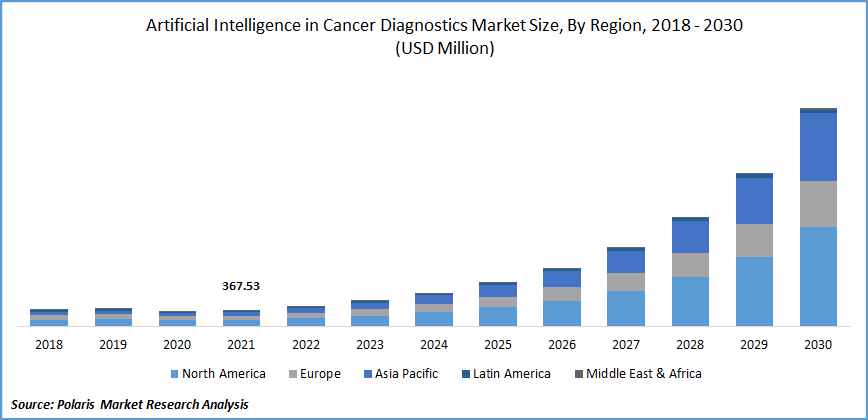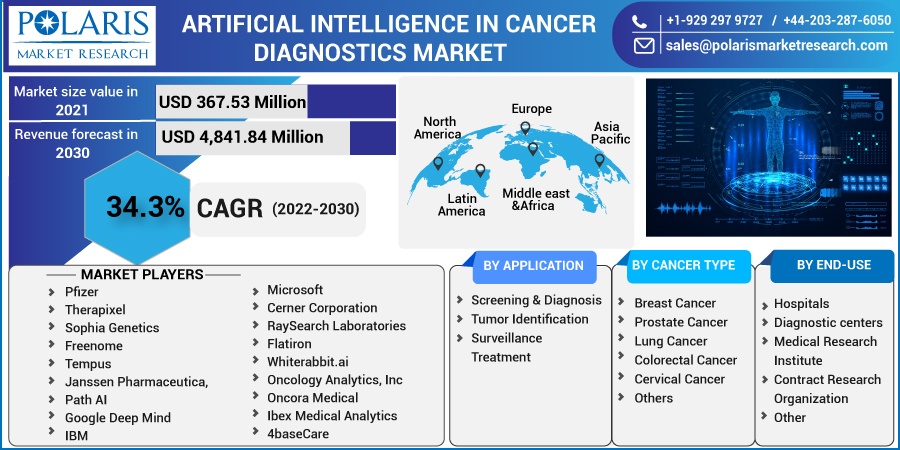
Artificial Intelligence in Cancer Diagnostics Market Share, Size, Trends, Industry Analysis Report, By Application (Screening & Diagnosis, Tumor Identification, Surveillance); By Cancer Type; By End-Use; By Region; Segment Forecast, 2022 - 2030
- Published Date:Sep-2022
- Pages: 101
- Format: PDF
- Report ID: PM2592
- Base Year: 2021
- Historical Data: 2018-2020
Report Summary
The global artificial intelligence in cancer diagnostics market was valued at USD 367.53 million in 2021 and is expected to grow at a CAGR of 34.3% during the forecast period. The growing demand for artificial intelligence in cancer diagnostics is expected to be driven by the increasing investment in the research of cancer, increasing technological advancement in the healthcare sector, and demand for early cancer diagnostics.

Know more about this report: Request for sample pages
Furthermore, the growing demand for cancer diagnostics at an early stage with the help of AI technologies is expected to have a positive impact on the development of artificial intelligence in the cancer diagnostics market growth. Artificial intelligence helps the healthcare sector with detection, monitoring, and taking images of the sample, making the procedure easy.
Artificial intelligence in the cancer diagnostics market was negatively impacted during the COVID-19 pandemic. The adoption of artificial intelligence and machine learning witnessed a slight dip owing to the paradigm shift of the medical sector’s focus on handling the rising cases of COVID-19.
With the increasing prevalence of cancer worldwide, the use of AI is rising, which enables the diagnostics of cancer with regular monitoring and storing of the data in a single device. Additionally, the growing startup companies are providing services globally on the same base, resulting in artificial intelligence in the cancer diagnostics market growth.
 Know more about this report: Request for sample pages
Know more about this report: Request for sample pages
Industry Dynamics
Growth Drivers
The rising prevalence of cancer worldwide is one of the primary drivers of artificial intelligence in the cancer diagnostics market. Artificial Intelligence is being used to detect cancer with efficacy and efficiency, detecting, classifying, and monitoring tumors, which is anticipated to drive the industry growth. The demand for advanced technology in the healthcare industry for identifying & screening cancer and growing startup companies operating in the industry is accelerating the demand for AI in the cancer diagnostic market.
According to WHO, Cancer is considered the second leading death cause globally, thus increasing the research for diagnosis. The major problem in cancer treatment is the diagnostics of cancer at later stages and not at early stages. However, using AI & ML algorithms will help in diagnosis with accuracy and will provide better analysis on the basis of quantitative metrics.
Report Segmentation
The market is primarily segmented based on application, cancer type, end-use, and region.
|
By Application |
By Cancer Type |
By End-Use |
By Region |
|
|
|
|
Know more about this report: Request for sample pages
Screening and diagnosis accounted for the largest share in 2021
The screening and diagnosis market segment accounted for the highest revenue share in 2021, owing to the use of artificial intelligence for scanning tumors and detecting the cancer stage. In addition, deep learning and machine learning are used to identify the movement of cancer at micro levels, identify the stage, provide proper therapy, and predict the response of immune therapy on patients.
The detection of pancreatic and ovarian cancer is difficult at an early stage; thus, with the use of AI, ML, and DL, it can be achieved. Many key players are investing in artificial intelligence technologies in the cancer diagnosis segment, contributing to the growth of artificial intelligence in cancer diagnostics.
Breast Cancer is commonly found among women
Based on cancer type breast cancer is the most common type of cancer among women of all age groups. According to WHO, cancer is the second largest death-causing disease. With the prevalence of increasing cancer, the R&D in the field is increasing.
The most common growth drivers for cancer are consumption of alcohol and tobacco, lack of physical activities, and proper diet. The use of AI & ML in detecting breast cancer at early stages contributes to the growth of artificial intelligence in the cancer diagnostics market. With the diagnostics of cancer at early stages, proper treatment can be provided to the patients, resulting in low death rates.
Diagnostic centers exhibit the significant growth
The diagnostic centers for disease-specific are growing in the industry, and government initiatives and increased funding in the healthcare sector are expected to expand artificial intelligence in the cancer diagnostics market. Government funding and initiatives for healthcare IT services are also gaining the market at a significant rate.
The technologically advanced equipment, trained staff, and medical professionals are present in diagnostic centers for assessment; therefore, the growing number of trained staff and medical professionals will fuel the growth of the industry.
North America dominated the market in 2021
North America dominated the market with the highest revenue share in 2021 and is anticipated to expand over the forecast period. The presence of major key players present in the region, increasing startup companies, technological advancement in the healthcare sector, and favorable government rules and regulations are the major factor for the growth of the industry. North America has a well-established healthcare infrastructure along with increased R&D activities, contributing to the industry growth.
Competitive Insight
Some of the major players operating in the global market include Pfizer, Therapixel, Sophia Genetics, Freenome, Tempus, Janssen Pharmaceutica, Path AI, Google Deep Mind, IBM, Microsoft, Cerner Corporation, RaySearch Laboratories, Flatiron, Whiterabbit.ai, Oncology Analytics, Inc, Oncora Medical, Ibex Medical Analytics, 4baseCare, Oracle, OncoHealth, and Others.
Recent Developments
In August 2022, Whiterabbit.ai signs an (National distribution) agreement with Arterys to expand AI-powered technology to detect the cancer at early stages.
In July 2022, Roche and EarlySign signed a partnership to develop and commercialize their LungFlag technology. The primary focus of their collaboration is to make an early diagnosis of lung cancer widely available to the population
Artificial Intelligence in Cancer Diagnostics Market Report Scope
|
Report Attributes |
Details |
|
Market size value in 2021 |
USD 367.53 million |
|
Revenue forecast in 2030 |
USD 4,841.84 million |
|
CAGR |
34.3% from 2022 - 2030 |
|
Base year |
2021 |
|
Historical data |
2018 - 2020 |
|
Forecast period |
2022 - 2030 |
|
Quantitative units |
Revenue in USD billion and CAGR from 2022 to 2030 |
|
Segments covered |
By Cancer Type, By Application, By End-Use, By Region |
|
Regional scope |
North America, Europe, Asia Pacific, Latin America; Middle East & Africa |
|
Key companies |
Pfizer, Therapixel, Sophia Genetics, Freenome, Tempus, Janssen Pharmaceutica, Path AI, Google Deep Mind, IBM, Microsoft, Cerner Corporation, RaySearch Laboratories, Flatiron, Whiterabbit.ai, Oncology Analytics, Inc, Oncora Medical, Ibex Medical Analytics, 4baseCare |
License and Pricing
Purchase Report Sections
- Regional analysis
- Segmentation analysis
- Industry outlook
- Competitive landscape
Connect with experts
Suggested Report
- Hydrogen Fuel Cell Vehicle (HFCV) Market Share, Size, Trends, Industry Analysis Report, 2020-2026
- Dropshipping Market Share, Size, Trends, Industry Analysis Report, 2021 - 2028
- Cement Board Market Share, Size, Trends, Industry Analysis Report, 2022 - 2030
- Cloud Managed Services Market Share, Size, Trends, Industry Analysis Report, 2022 - 2030
- Mucormycosis Market Share, Size, Trends, Industry Analysis Report, 2021 - 2028

